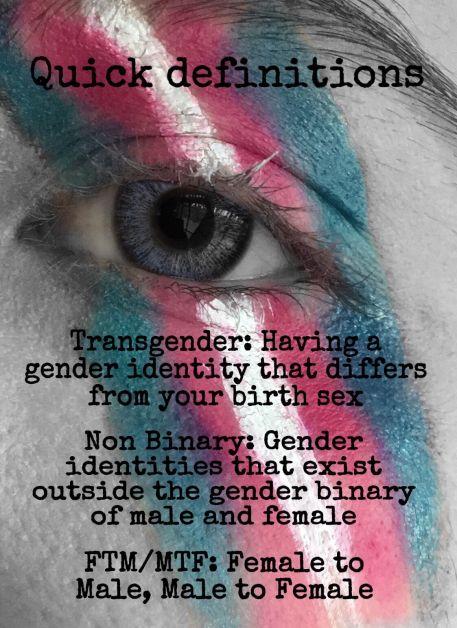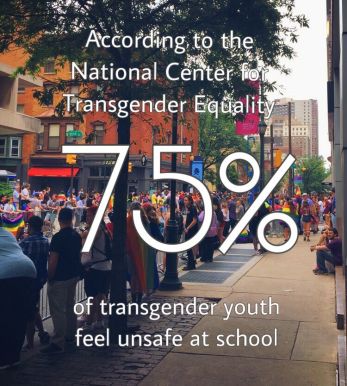Author’s Note: The name of the subject of this article has been modified to protect his identity.
Defining Gender
Starting your first year of college already comes with its own set of fears and challenges. Lee has aspirations to triple major on top of already being an honors student. But unlike his peers, he must now also fear for the loss of his Title IX protection. Lee is an FTM (female to male) transgender student.
During the final months of 2018, the Trump Administration, in collaboration with the Department of Justice and the Department of Education, proposed a new law that would change the definition of the word “gender” in the Title IX policies. Title IX is a policy that was put in place to prevent sex-based discrimination in any federally-funded educational program or institution. Since it is currently based on self-identification, Lee is protected.
“A lot of trans people in my generation discover they’re trans at a much younger age because they have access to so much information on the internet,” Lee said. “In middle school and high school, we discover who we are then a lot of us immediately try to start identifying that way in public, in school. It can be difficult. You can be misgendered on purpose. Trans people are often subject to bullying, harassment, discrimination and a lot of schools don’t take it very seriously. If we lose title IX protection, it’ll just worsen a thousand percent.”
In 2016, the Obama Administration published a letter titled Dear Colleague to clarify that despite Title IX using the word “sex” in its policies, it also recognizes students’ individual gender identities. This meant that the Title IX protections were inclusive of transgender and non-binary students. The letter acknowledged that there was a distinction between sex and gender, stating that “Gender identity refers to an individual’s internal sense of gender. A person’s gender identity may be different from or the same as the person’s sex assigned at birth,” and that denying equal opportunities to transgender students goes against what Title IX stands for.

However, new proposals made by President Trump contradict this sentiment. The new proposed policies intend to force students to only be recognized as the sex they were assigned at birth. For students who are cisgender (someone whose gender identity is the same as their birth sex), these new policies will have little to no effect. However, if a student self-identifies as transgender or non-binary, the new proposed policy will no longer accommodate that.
“If the new Title IX goes into effect, it’ll just make things worse for many trans people across America, especially younger trans people who are still reliant on their parents,” Lee said. “This was the first election that I was really old enough to pay attention to and understand. I knew that Trump and Pence both had a history of anti-LGBT+ views and if they were elected these issues would pop up. As soon as the trans military ban was brought up, I knew it was just a matter of time before me and millions of other Americans would have to fight for our civil rights.”
A memo was created by the Department of Health and Human Services defending the Trump Administrations sentiment, “Sex means a person’s status as male or female based on immutable biological traits identifiable by or before birth … The sex listed on a person’s birth certificate, as originally issued, shall constitute definitive proof of a person’s sex unless rebutted by reliable genetic evidence.”
“A lot of the reason why they’re doing this is just bigotry and hatred,” Lee said. “They don’t see trans people as a whole and they think we’re making this up or doing it for attention or going against the bodies that were given to us. They’re trying to retaliate against trans people coming out, especially trans children. Since they’re basically trying to erase trans people from existence, this situation is just an exaggerated version of what we already deal with now.”
If these proposed policies were to eventually pass, Lee’s biggest fear is that someone may find out he is no longer protected and take advantage of that. Lee has come out to a lot of people on campus and worries that people who dislike the fact he is transgender may feel empowered to harass him under the assumption there would be no consequences.
“People are okay with trans people being discriminated against because there’s this weird idea of what trans people are,” Lee said. “They think trans women are ‘perverts’ who want to harass people. Especially with the bathroom situation, nobody ever thinks about trans guys using the guy’s room. If the rules are based on birth sex, then you’re going to have men, like myself, forced to use the women’s restroom.”
Living with Dysphoria
When one is transitioning or intends to transition, transgender people experience something known as Gender Dysphoria. Those who suffer from Dysphoria may often experience feelings of distress, discomfort and dissatisfaction as a result of their birth sex or outer appearance not matching their gender identity. Not having the resources to transition and being referred to as the incorrect pronouns are things that may trigger feelings of dysphoria.
“My dysphoria is very bad but I’ve somehow managed to get by without the hormones and the surgeries yet even though I do want to get them,” Lee said. “It’s a sticky situation because I’ll be on my parents’ insurance until I’m 25-years-old and they don’t really understand that I am trans even after I came out to them two years ago.”
Although he identifies as male, Lee currently lives in a female dorm room on campus. Despite this, he still feels welcomed by Cabrini and that if he were to ever be discriminated against, that the University would take it very seriously.
“My dysphoria has gotten better since I’ve been in college because I’ve been able to live here as a guy. I’m out to a lot of people on campus and they try their best to remember to refer to me with he/him pronouns. Even if they mess up, they’re super apologetic and I understand because I know they’re not doing it on purpose. The only thing I can’t do is live in the guy’s dorms but with what I’ve been able to do on campus it’s certainly helped dealing with the dysphoria.”
Fighting back
Homophobia and transphobia are not the only issues within the LGBTQ+ community. Many identities, commonly bisexuality, asexuality and transgender/non-binary, often struggle with erasure.
Erasure is defined as the societal tendency to minimize or ignore the existence of a group of people. One of the biggest examples of this was the Stonewall Riot. While it is commonly remembered that this was a movement for gay rights, historians have often erased the fact that the leaders of Stonewall were transgender black women.

“We’ve been constantly erased throughout history and I feel that if gender becomes redefined in this proposal, it would only perpetuate this erasure. It’s almost as if they’re trying to redefine trans people out of existence,” Lee said. “It’s a sad world that we live in and many people won’t understand the effect that it will have on America. Because of the trans erasure they don’t think there are that many of us. To be treated as inhuman or as second-class citizens, all the progress we’ve made in the past decade is slowly being reversed. People don’t understand the repercussions because there’s so much weird stigma.”
Jose Rodriguez is the director of Student Diversity Initiatives. Within his first months working at Cabrini, he recalls meeting prospective students who self-identified as transgender or non-binary. After they had raised questions regarding campus policies, Rodriguez realized that there was much work to be done to clarify and improve policies so that no student is excluded. Cabrini is actively working to bring changes to residence life, student admission, and athletics.
“In regards to policies and behaviors, we will continue to challenge ourselves to evolve to make sure that everyone on this campus, especially students, feel that they are welcomed as a part of this community,” Rodriguez said. “We want to acknowledge them for who they are, not who we think they should be, and how they want to live as their most authentic self. I know that the current government administration may think very differently from what [Cabrini] thinks, but we have a right to make sure that people are given opportunities to be who they are. That’s not only part of my job, but it should be everyone’s responsibility to make sure students feel safe.”
Lee strongly believes that there is power in numbers and that the only way students can combat the new policies is by speaking out and advocating for their rights. “The only way us students can fight back against this is if we came together. One school standing up here or there won’t do much but if our generation banned together, we could fight back against this attempt at discrimination.”



